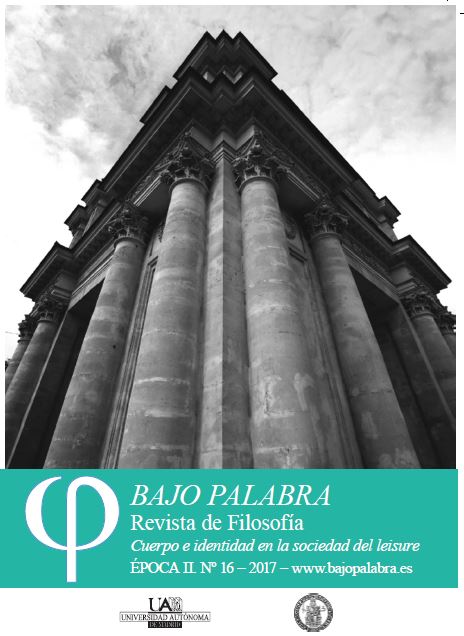Copyright (c) 2017 Fabiana Leone

TQuesto lavoro è fornito con la licenza Creative Commons Attribuzione 4.0 Internazionale.
Abstract
A pesar del creciente número de descubrimientos en la neurociencia, los enormes logros tecnológicos y algún nuevo impulso teórico, aún sigue firme entre los científicos –así como en el sentido común– un contraste claro y marcado entre la mente y el cuerpo. En la actualidad, esta imagen del ser humano, heredada de una cultura platónicocartesiana consolidada, comienza a aparecer en peligro no solo por algunas nuevas perspectivas teóricas, sino también por la propagación de dinámicas socio-culturales originales que se producen principalmente en la esfera de las prácticas diarias, del fitness y de la gestión del tiempo libre. Este ensayo focalizará su atención en el análisis del uso de algunos de los dispositivos tecnológicos más utilizados en el mercado del fitness; reflexionará acerca de la imagen del cuerpo y de las transformaciones de la identidad que tienen lugar en nuestra sociedad, tratando de examinar las últimas posibles aportaciones de la neurociencia a los paradigmas tradicionales de las ciencias sociales.
Palabras clave: identidad, tecnología, neurociencia, sociología del conocimiento.
Abstract:
Despite the large number of discoveries in Neuroscience, great technological achievements and some renewed theories, the idea of a clear and stark contrast between mind and body is still widespread amongst scientists and common people. Nowadays, this interpretation of the human being (a clear legacy of a deeply consolidated Platonic- Cartesian culture) is affected both by the new theoretical perspectives and by the spreading of some socio-cultural dynamics that manifest themselves daily in body and free time management. Inspired by the analysis of one of the most common technological devices for fitness, the aim of this work is to propose some reflections on identity and body image transformations in our society. Moreover, the establishment of a relationship between the latest emerging contributions in Neuroscience and the traditional paradigms of contemporary social sciences will be pursued by the author.
Keywords: identity, technology, neuroscience, sociology of knowledge.
Downloads
Riferimenti bibliografici
BORGHI, A., CARUANA F., Il cervello in azione, Bologna, Il mulino, 2016.
BERGER P., LUCKMANN, T., La realtà come costruzione sociale, Bologna, Il mulino, 1969. (The social construction of reality, Random House, NY, 1966)
BRETON, P., L’utopia della comunicazione. Il mito del “villaggio planetario”, Torino, Editore Utet-Telecom, 1995 (L'utopie de la communication, La Découverte, 1992).
CHANGEUX, J.P., L’homme neuronale, Paris, Fayard,1982.
DAMASIO, A., L’errore di Cartesio. Emozione, ragione e cervello umano, Milano, Adelphi, 1995 (Descartes' Error: Emotion, Reason, and the Human Brain, 1992).
DAVIS, E., Techgnosis. Miti, magia, e misticismo nell’era dell’informazione, Napoli, Ipermedium Libri, 2001 (TechGnosis: Myth, Magic & Mysticism in the Age of Information)
DE WALL, F., Il bonobo e l’ateo, Milano, Raffaello Cortina, 2013. DI NUOVO, S., Prigionieri delle neuroscienze?, Milano, Giunti, 2014.
GALLAGHER, S., ZAHAVI, D., La mente fenomenologica. Filosofia della mente e scienze cognitive, Milano, Raffaello Cortina, 2009.
PECCHINENDA, G., “The Genome and the Imaginary: Notes on the Sociology of Death and the Culture of Immortality”, International Review of Sociology, vol 17, n. 1, 2007, pp. 167-185
PECCHINENDA, G., Il Sistema Mimetico. Contributi per una Sociologia dell’ Assurdo, Napoli, Ipermedium Libri, 2014.
WOLFF, F., Notre Humanité, Paris, Fayard, 2010.
